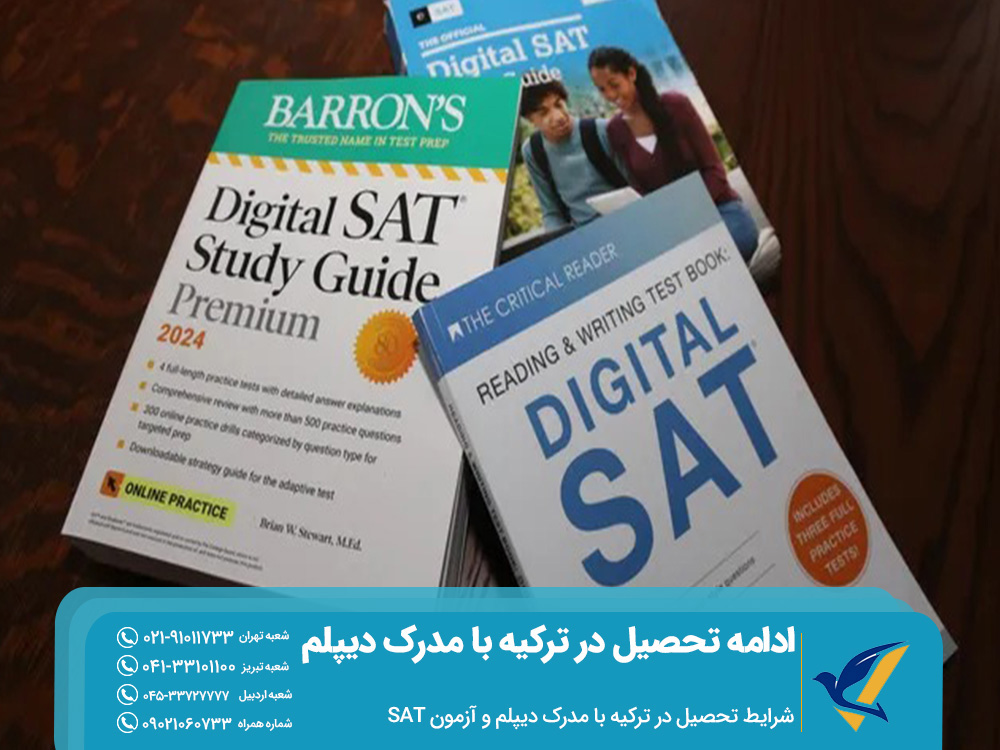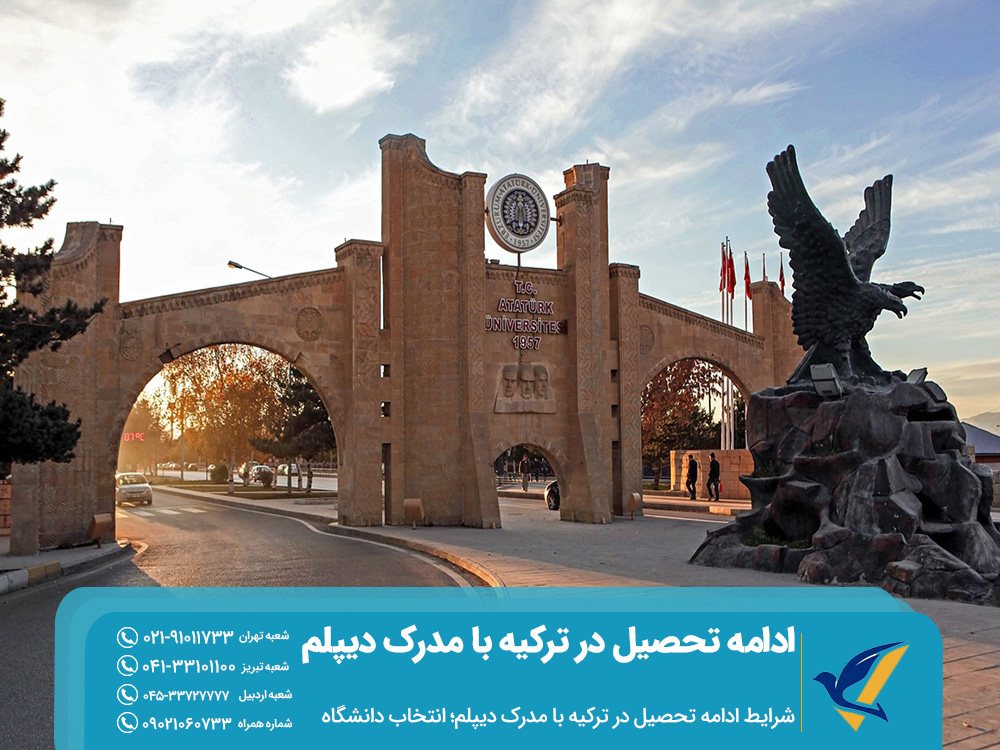Continuing Education in Turkey with a High School Diploma + 2025 Requirements
Continuing education in Turkey with a high school diploma is a topic of great interest for many students who wish to study abroad. Often, many immigrants may not hold a bachelor’s or master’s degree but have decided to continue their studies in Turkey.
Undoubtedly, Turkey has provisions for individuals with a high school diploma or associate degree. If you are among those who want to continue their education in Turkey with a high school diploma or simply have a strong motivation to study there with this qualification, stay with us until the end of this article by Elm Vira to learn more about student migration to Turkey.
Why Choose to Study in Turkey?
Overall, Turkey provides a safe and supportive environment for students. Of course, every country has its advantages and disadvantages for studying abroad, but the favorable conditions for continuing education in Turkey with a high school diploma make its benefits stand out more.
Thanks to these suitable conditions, those who want to pursue their studies in Turkey with a high school diploma can make their decisions more confidently. Among the most important factors when choosing a destination for study migration are safety and affordability.
Turkey is well aware of this and offers a calm, exciting, and enjoyable student life experience. Keep in mind that knowing your personal, academic, and cultural preferences well will help you make a better decision. However, being informed about the advantages of studying in Turkey can also make your decision to migrate for education much easier.

Requirements for Continuing Education in Turkey with a High School Diploma
Universities in Turkey offer opportunities for international students to pursue undergraduate, master’s, and doctoral degrees. One of the most important requirements for continuing education in Turkey with a high school diploma is having a high school diploma certificate along with a suitable academic transcript for the chosen field of study. Applicants wishing to continue their education in Turkey with a high school diploma must also provide proof of proficiency in either English or Turkish, depending on the university and program. Below are some key conditions for studying in Turkey with a high school diploma:
-
Requirements for Undergraduate Studies in Turkey with a High School Diploma
To study at the undergraduate level in Turkey, applicants need to have a high school diploma and an English language proficiency certificate such as IELTS or proof of Turkish language skills. The typical duration of an undergraduate degree in Turkey is about four years. Most undergraduate programs in Turkey are taught in Turkish, but there are also programs offered in English.
For public universities, one of the conditions for studying with a high school diploma is having a Turkish language certificate such as the TOMER certificate. However, applicants who do not have this certificate can attend preparatory Turkish language courses in Turkey to acquire the necessary language skills.
The tuition fees for undergraduate programs at public universities in Turkey typically range from $100 to $300 per year. In contrast, private universities charge considerably higher tuition fees, ranging roughly from $8,000 to $25,000 per year.
-
YOS Exam
It is important to note that applicants who want to study medicine, dentistry, pharmacy, or engineering programs in Turkish universities must pass the YOS exam with the required score. Turkish universities hold this exam once a year independently.
The first part of the YOS exam assesses applicants’ academic knowledge in subjects like mathematics, physics, biology, chemistry, and intelligence. This section consists of 80 multiple-choice questions, and candidates have about 90 minutes to complete it. The questions in this section are available in Turkish and English.
The second part of the YOS exam evaluates the applicant’s Turkish language skills, including comprehension and writing. Candidates have 60 minutes to complete this section.

3. Conditions for Studying in Turkey with a High School Diploma and the SAT Exam
Another important requirement for continuing education in Turkey with a high school diploma, especially in English-language universities, is having a valid SAT score. The SAT exam is a standardized test commonly used for university admissions in the United States, the United Kingdom, Canada, and Australia. It is held six times a year, and the test results are valid for up to five years.
The SAT evaluates applicants’ academic aptitude and general knowledge. Specifically, it assesses scientific knowledge in subjects such as chemistry, physics, geology, biology, psychology, economics, sociology, as well as geometry, statistics, probability, and high school-level mathematics.
4. TOMER Exam
As you may know, the TOMER exam is the most recognized Turkish language proficiency certificate in Turkey. Applicants wishing to study in public universities with a high school diploma must have a valid TOMER certificate. The TOMER Turkish language certificate holds the same significance and credibility as international English language certificates such as IELTS or TOEFL.
5. Conditions for Studying English in Turkey with a High School Diploma
One of the key conditions for studying in Turkey with a high school diploma in English is having an English proficiency certificate such as IELTS or TOEFL, as required by the university. Applicants who do not yet have an English language certificate or did not achieve the required score in the placement test need not worry. They can enroll in English preparatory courses offered by colleges in Turkey to acquire the necessary language skills.
It is worth noting that students who wish to study in English in Turkey can pursue undergraduate degrees in fields such as Computer Engineering, Software Engineering, Electrical Engineering, Translation, Business Administration, English Language and Literature, English Teaching, and International Business.

Conditions for Continuing Education in Turkey with a High School Diploma: Choosing a University
One of the most important and first steps for continuing education in Turkey with a high school diploma is selecting the right university. Applicants should choose universities in Turkey based on their proficiency in Turkish or English. Those who hold a certificate of proficiency in Turkish (such as Istanbul Turkish) or are fluent in the language can opt to study at public universities in Turkey. It is important to know that most undergraduate programs in Turkish universities are taught in Turkish.
However, it is also possible to study undergraduate programs in English at universities in Turkey. For international students, studying at public universities in Turkey can sometimes be tuition-free or require minimal tuition fees. Additionally, students who study at public universities and obtain scholarships can benefit from free or low-cost education. On the other hand, private universities in Turkey charge considerably higher tuition fees compared to public universities.
Obtaining Admission from Turkish Universities
Applicants who have the financial means to cover their tuition and living expenses in Turkey and have chosen their desired program and university must submit the required documents to obtain admission. It is important to note that the required documents for admission vary slightly between universities, as each institution may have specific document requirements.
At this stage, applicants must submit their high school diploma and pre-university diploma along with their transcripts translated into English or Turkish to the university. Generally, the most important documents required by all universities for issuing admission are:
-
High school diploma and pre-university certificate translated into English or Turkish
-
Transcripts of high school and pre-university studies translated into English or Turkish
-
English or Turkish language proficiency certificate, depending on the university’s requirements
-
A strong statement of purpose or motivation letter
-
Medical health certificate
-
Proof of sufficient financial means
-
Valid passport
-
Receipt of payment for the application or document review fee

Eligible Candidates for Studying in Turkey with a High School Diploma
It is important to know that the requirements for admission to study in Turkey with a high school diploma are set by the Council of Higher Education (YÖK) in Turkey. Based on these regulations, only individuals who meet the following criteria can be admitted as international students to Turkish universities:
- Fully foreign nationals
- Individuals who have obtained Turkish citizenship and have left the country for immigration to Turkey with permission from the Ministry of Interior
- Turkish citizens who completed their high school education outside of Turkey
- Turkish citizens who completed their high school education in private schools abroad (excluding TRNC schools)
- Students from the Turkish Republic of Northern Cyprus (TRNC) who hold the GCE AL exam certificate
If you fall into any of these categories, you can register as an international student at universities in Turkey and benefit from educational opportunities in the country.
Tuition and Living Costs in Turkey with a High School Diploma
Generally, the cost of studying in Turkey with a high school diploma varies depending on the type of university (public or private) and the program of study. For undergraduate programs, tuition fees at public universities typically range from $240 to $1,500, while private universities charge between $5,000 and $20,000. For graduate programs, tuition fees at public universities usually range from $300 to $900, whereas private or foundation universities charge between $5,000 and $20,000.
In addition to tuition, living expenses vary based on different factors. It is estimated that international students may spend approximately $400 to $500 per month on phone bills, accommodation, entertainment, clothing, travel, and food. Keep in mind that this amount depends on lifestyle, location, and available facilities.
To reduce the cost of studying in Turkey, students can benefit from scholarships offered by the Turkish government or choose to live in university dormitories and utilize university facilities. These measures can significantly help lower expenses and support students in their academic and daily lives in Turkey. Overall, Turkey provides a friendly environment and reasonable conditions for students, with relatively affordable tuition and living costs.

Advantages of Studying in Turkey with a High School Diploma
There are many reasons to pursue higher education in Turkey with a high school diploma. This country, with its unique natural beauty, cultural richness, transportation infrastructure, and the distinct character of its cities, is one of the world’s top destinations for students. Some of the key advantages of studying in Turkey include:
Firstly, Turkey acts as a bridge to the world, offering an exceptional opportunity to access diverse cultures and experiences.
Secondly, the Turkish education system aligns well with students’ dream careers. Turkish universities give students the chance to choose majors related to their ideal professions and provide education that helps them achieve their career goals.
Thirdly, Turkey boasts a comprehensive university education system. Universities in Turkey are active across a wide range of scientific and research fields, giving students ample opportunities to learn and conduct research in various disciplines.
Fourthly, the cost of living in Turkey is very reasonable. Compared to other European countries, living expenses in Turkey are significantly lower.
Overall, Turkey’s unique features make it one of the best destinations worldwide to continue your education with a high school diploma.
Summary
Based on the above points, studying in Turkey with a high school diploma is an exceptional opportunity for international students. This experience not only allows you to benefit from high-quality education but also provides a chance to immerse yourself in a multicultural environment and lifestyle. Given these advantages, studying in Turkey can be an important step toward achieving your academic and professional goals.
Since the process of immigration and studying abroad can come with challenges and complexities, receiving the best guidance and support is crucial. Elm Vira Immigration Institute, fully aware of the sensitivities and challenges of educational migration, strives to guide applicants through the best legal pathways. Elm Vira specializes in gathering and providing the latest information about studying abroad. For more details and free consultation, please visit the consultation section.
میانگین امتیازات 5 از 5
Vote count: 1 Vote